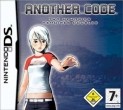Review: Another Code: Two Memories
Posted 01 Jul 2005 at 00:21 by Jordan
DS Review
Imagine the scene: At the tender age of three your mother is shot right in front of you, as you hide inside a closet trying desperately not to be found; shortly afterwards your father disappears. Ten years pass and the day before your fourteenth birthday you receive a package which contains a letter and a strange electronic device, known as the DAS from your father, whose memory is vague and dim. This is the rather dark story of Ashley Robins the heroin of Another Code: Two Memories. Another Code is the first of a so called "new breed" of Nintendo games, with Sataru Iwata being the director of the game, it really can't go bad, can it?
Before getting my hands on a copy of this game, I actually didn't know anything about it. It seemed to get very little press attention even though it is pretty different from anything we've seen on a handheld since Broken Sword on the GBA a few years back, a title with a familiar feel. Except this time you have to use your DS' capabilities to your advantage, and thinking outside of what the game has already taught you is always needed.
A device that Ashley uses in the game, known as the DAS, which strangely looks like a Nintendo DS, helps her with all the tasks at hand, such as: saving, using DAS cards, taking photos which help in puzzles and looking at items. It's quite a nice setup; although the continuously spinning icons did do my head in after a while.
The controls of Another Code are quite simple. The game uses a combination of touch screen and, if you wish, the buttons and D pad. To look at certain objects or parts of the rooms in more detail you simply touch the specific icons on the top right of the screen then it will appear on the top screen. All in all the touch screen is used efficiently - although I did find it is much easier to control Ashley using the D pad instead of using the screen with of character movement.
The bulk of the game is obviously the puzzles. They range from simply rotating pieces of a wood to fit onto a sign to blowing dust off paintings with the microphone. This is quite clever since the game doesn't tell you how to solve any of the puzzles and just lets you figure it out for yourself. Although the key problem is that the puzzles slowly become the same and apart from two puzzles in chapter 3 it's all quite easy to be honest. There's no real skill involved. The game also forces you to back track to find items you have previously seen but could not pick up to complete tasks that you are currently doing. The developers did this, it seems, to just extend the life of the game.
My major hang up about this game are two things. First of all the story is really, really bland. In fact the game just seems to string you along with the father story. Initially the story says he's in one room. Once you finally get to the room it turns out he left you a memo on a DAS card saying that he's actually somewhere else. Feels like the whole "The princess is in another castle" thing used way back in Mario. The second shortcoming is the game is way too short – disappointingly, six hours did it for me. I got lost a couple of times, but that's about it. Although I suppose it does have some replay value with the 'alternative ending' incentive to collect all the items.
The game has quite fantastic presentation; everything from the 3D top down view of the game world to the amazingly detailed photos that are presented on the top screen. Ashley and the other characters are extremely well drawn and have a great anime/manga feel to them. Some quite nice lighting is used, for example early on in a forest section: the sun reflects off the trees and casts a great shadow on to the floor below. Sure there are a few problems with the graphics, the models have pretty low polygon rates, some of the rooms look rather the same in places and there are jaggies pretty much everywhere. But overall it looks great.
The sound effects and the music, though, are just okay - there's nothing to write home about. In fact they actually get pretty damn repetitive as the same music is used in similar parts of the game. The "surprise" sound effect is used way, way too much that it gets so damn annoying every time you hear it. Although saying that some of the music in the rooms fits in very well and is rather atmospheric but it just isn't used to its maximum potential.
Another Code: Two Memories is a short but thrilling 'point and click' puzzle game. The story isn't great, but it uses some nice techniques to keep you thinking for a few hours.
N-Europe Final Verdict
If only Another Code was double its length. I would've traded a lengthier wait for a similarly longer story, but it's still definitely worth £30. It's enjoyable and unputdownable until finish.
- Gameplay4
- Playability3
- Visuals3
- Audio3
- Lifespan2
Final Score
7
Pros
Makes you think quite a lot
Great use of the DS hardware
Interesting puzzles
Cons
Predictable Story
Way too short


























